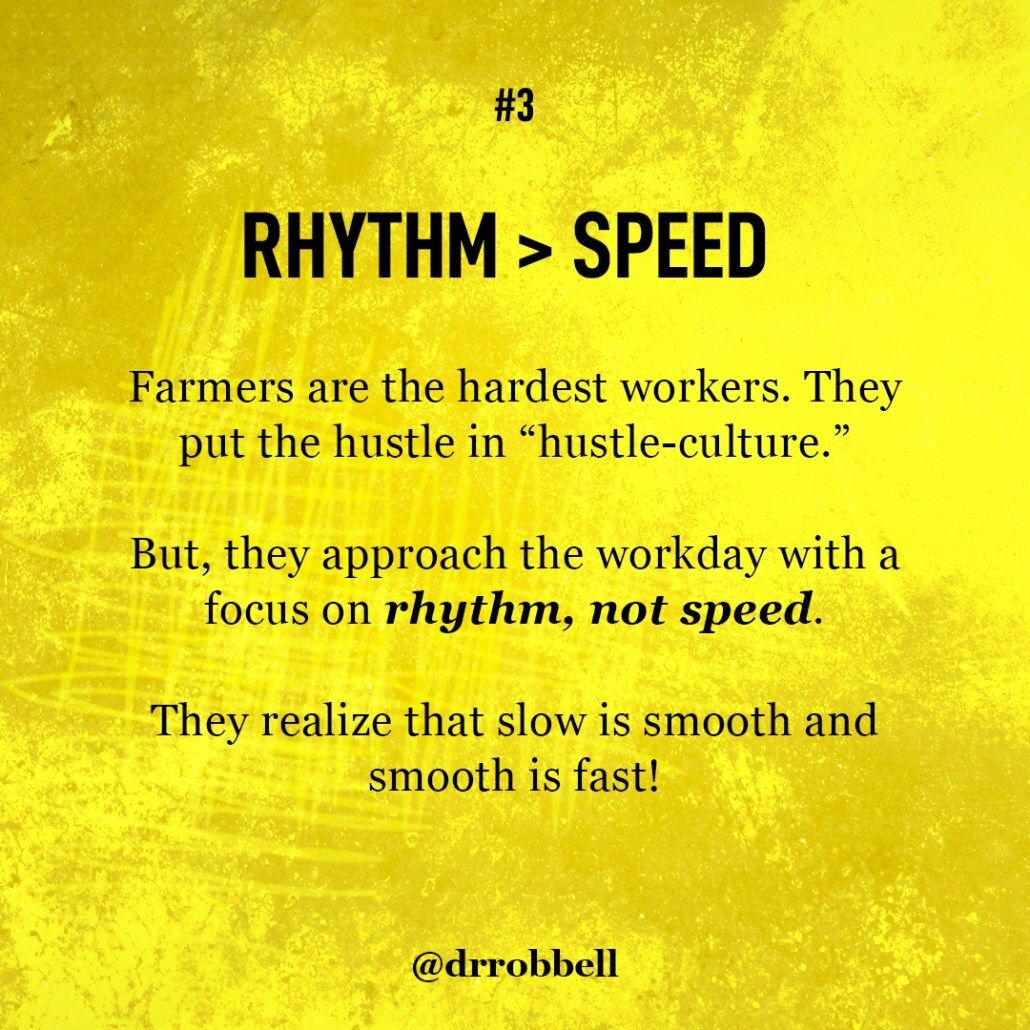Why Rhythm is More Important Than Speed
Slow Is Smooth And Smooth is Fast
Farmers are the hardest workers. They were the one’s who put the hustle in “hustle-culture.” I have never met someone who said, “farmers don’t work hard.”
However, they approach the workday with a focus on rhythm, not speed. They are up at 4 am and grind away, but they still have time for coffee and breakfast. They also make sure dinner is eaten with peace and patience. And the leftovers are what become supper!
They realize that slow is smooth and smooth is fast!
They understand and apply that the day the seed is planted is not the day it’s harvested!

Stating that rhythm is more important takes nothing away from the importance of speed, it’s just that rhythm is even more important! Just as rhythm is most important for athletes, it is the same in business life as well.
Thus, it does NOT mean that speed is bad. Speed is great, It’s crucial in fact to success. I agree mostly with the statement of “first in, wins.” However, think about when you are at you best performance, are you rushed, overwhelmed, and stressed? This is why rhythm is more important than speed.
More often than not, we operate at a controlled rhythm of our day, our week, and month. This results in slow, steady progress. Because when we need, we can always speed up to our top speed or slow down from our max velocity.
What happens when we rush too much?
When we rush, mistakes occur. It’s inevitable. There is a speed and accuracy trade off in everything we do. The faster something is, the more negative variance it brings. Check out our post on how patience actually saves patients.
So we are doing too many things, or aren’t transitioning well in-between projects or people efficiently enough, mistakes will occur. When we become too focused on the deadline or speed, we’ll neglect a detail and it will eventually catch up to us.
Timelines are important to getting things completed. Although, we must still be flexible enough to have a bend, don’t break approach to our schedule and deadlines. Resiliency and mental toughness depend upon remaining adjustable and patient with results.
Rhythm is More Important Than Speed
Since time is our most precious resource, we must treat it as such.
We need to use these four steps below to help maximize our time.
It begins by having a plan and segmenting our day. We start by carving out time that allows us to stay focused completely on the task at hand! Rhythm is more important than speed because it is the path on how to be efficient, productive, and good looking (okay, maybe not good looking). These four steps below are the basis for our book on Mental Toughness– I Can’t Wait To Be Patient.
This is how we can “get rhythm” in our day.
Step #1 Examine The First Hour of Your Day
The first hour of the day sets the rudder for the rest… We need to start the day out strong and in rhythm, not rushing around. Allow yourself ample time.
Step #2 Maximize Your Transitions
We move from place to place and people to people without really decompressing and setting our attention and attitude on how we want to show up.
Step #3 Plan For Flow
The beauty of life and sports is being in the zone. Getting so immersed into the task at hand is the best gift we can give ourselves and any activity in which we can achieve this zone is magical!
Step #4 Schedule The OMD Time— “Off My Desk”
These OMD’s are the things that we don’t want to do, but the tasks that we need to do! These must be scheduled in order to achieve rhythm in our busy day!
Dr. Rob Bell is a Sport Psychology Coach. DRB & associates coach executives and professional athletes. Some clients have included three different winners on the PGA Tour, Indy Eleven, University of Notre Dame, Marriott, and Walgreens.
Mental Toughness Podcast as we interview expert athletes and coaches about Mental Strength and their Hinge Moment.
New Blog Posts are published weekly.
Follow on Twitter @drrobbell
Follow on Instagram @drrobbell
